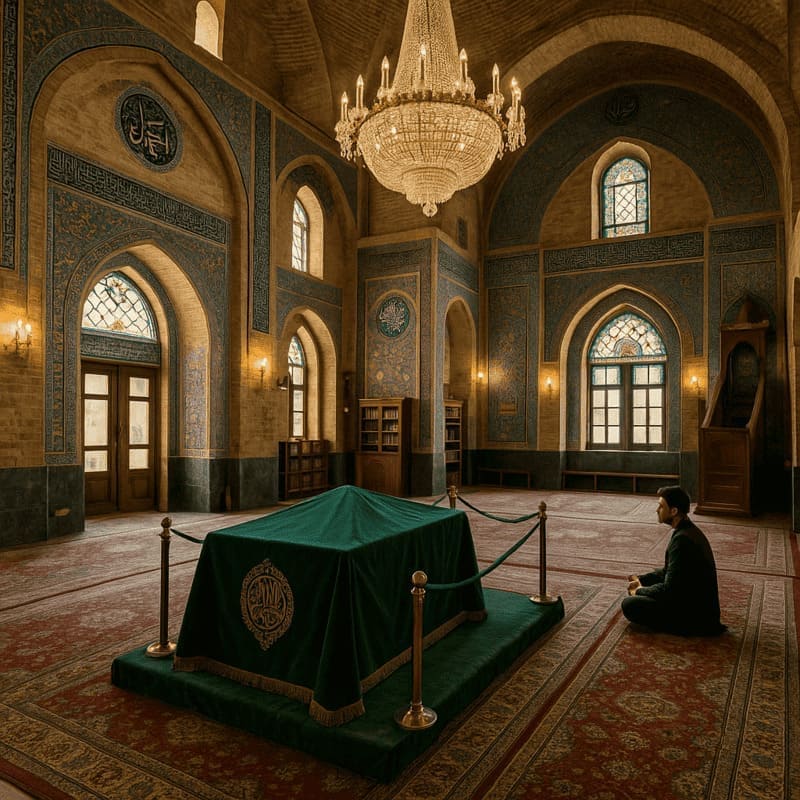The Foundation and Development: From the Beginning to Its Spread in Iraq
The Qadiriyya Order in Iraq is one of the oldest and most influential Sufi orders. It was founded in the 6th century AH by Sheikh Abdul Qadir al-Jilani, who was born in Gilan, Iran, and passed away in Baghdad. Sheikh Abdul Qadir had a remarkable ability to attract people and spiritually purify them, making him a profound influence on Iraqi society and the Islamic world.
Since its foundation, the Qadiriyya Order has spread widely across Iraq, with Baghdad becoming an important spiritual center. The followers of the order adhered to a way of life based on asceticism, humility, and piety. Moreover, the Qadiriyya Order became known for teaching human values such as mercy and forgiveness.
The order’s spread grew stronger due to its spiritual influence and its ability to adapt to the changing conditions in Iraq. Every region in Iraq had centers or zawiyas (spiritual lodges) dedicated to the Qadiriyya Order, making it an integral part of Iraq’s spiritual and cultural identity.
Sheikh Abdul Qadir al-Jilani: Founder of the Qadiriyya Order and His Spiritual Vision
Sheikh Abdul Qadir al-Jilani is the founder of the Qadiriyya Order and is considered one of the greatest scholars and Sufis in Islamic history. Born in Gilan in 1077 CE and passing away in Baghdad in 1166 CE, he played a pivotal role in spreading both religious and Sufi knowledge, renowned for his extraordinary ability to spiritually influence and enlighten.
Sheikh Abdul Qadir’s vision was centered on a profound connection with God, believing that the path to God could only be achieved through complete asceticism and sincere repentance. He also emphasized the importance of purifying and nurturing the soul through worship and deep reflection, stressing the significance of spiritual retreat and remembrance of God.
His teachings aimed to unite Muslims with the concept of oneness with God and to achieve inner tranquility, which would reflect positively on society. His principles transcended the geographic boundaries of Iraq and reached other parts of the Islamic world, leaving a lasting spiritual impact that is still evident today.
Teachings of the Qadiriyya Order: Spiritual Practices and Their Impact on Society
The teachings of the Qadiriyya Order are based on a set of spiritual practices designed to purify and strengthen the soul. One of the most important practices is the continuous remembrance of God (dhikr), In which followers are encouraged to repeat invocations and reflect on God’s attributes. Additionally, communal prayers and retreats in mosques and spiritual lodges (zawiyas) are central to enhancing spirituality.
The Qadiriyya Order also promotes asceticism and detachment from worldly desires. Followers are urged to be kind in their interactions with others, and great importance is placed on good deeds, including helping the poor and needy. These spiritual practices had a profound social impact, helping to foster a cohesive and harmonious society built on cooperation and love.
The Iraqi community greatly benefited from these teachings, which contributed to spreading social peace and humanistic values among the people. To this day, these practices remain an integral part of daily life for many Iraqis.
Sufism in Iraq: The Role of the Qadiriyya Order in Preserving Spiritual Heritage
Sufism in Iraq has long played an important role in preserving the spiritual and intellectual heritage of the Islamic nation. The Qadiriyya Order, as one of the most prominent Sufi orders, has made significant contributions to preserving values of faith and spirituality. Through its teachings, which focus on humility and piety, the order has helped root concepts of tolerance and forgiveness in Iraqi society.
The Qadiriyya Order has been, and continues to be, a key factor in shaping Iraq’s spiritual identity. Its influence extends beyond religious education to the promotion of practices like dhikr (remembrance) and spiritual reflection, which lead to inner peace. Through these practices, followers have maintained a strong spiritual connection to God, which is central to life’s spiritual journey.
The role of the Qadiriyya Order in preserving Iraq’s spiritual heritage has been significant, helping to sustain traditional religious practices and passing on Sufi ways of life to future generations.
The Qadiriyya Order and Contemporary Challenges: How It Faces Changes in the Modern Era
Like many Sufi orders, the Qadiriyya Order faces challenges in the modern era due to social and cultural changes. With technological and economic advancements, the Qadiriyya Order faces an important question: how can it preserve its spiritual practices in a rapidly changing world?
The answer lies in the order’s ability to adapt without compromising its core teachings. With the rise of social media, the Qadiriyya Order has found new ways to connect with younger generations by spreading its teachings online. This has allowed the new generation to engage with spiritual values, such as tolerance and love, in ways that resonate with modern life.
Despite these challenges, the Qadiriyya Order remains highly valued by its followers, who believe that maintaining spirituality in the fast-paced modern world can offer inner balance and address the psychological challenges faced by individuals.
The Global Impact of the Qadiriyya Order: From Iraq to the Islamic World
The influence of the Qadiriyya Order extends beyond Iraq, reaching many parts of the Islamic world. Through the teachings of Sheikh Abdul Qadir al-Jilani, the order spread to countries such as Turkey, Egypt, India, and other regions of North Africa.
In each of these countries, the Qadiriyya Order represented a source of spiritual and religious inspiration. It contributed to spreading concepts of inner peace through practices such as dhikr and prayer. The order’s influence was not limited to religious education but focused on strengthening social bonds and cooperation among Muslims.
Today, the Qadiriyya Order remains one of the most influential Sufi orders in the Islamic world. Its followers meet in spiritual centers and lodges across continents, adhering to the teachings of Sheikh al-Jilani, which emphasize purity of life and sincere intentions.

